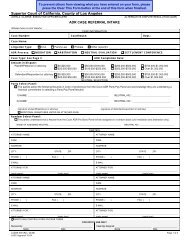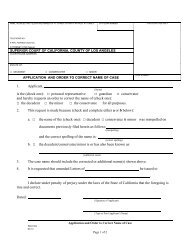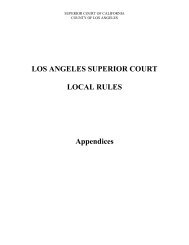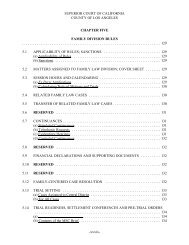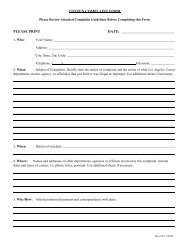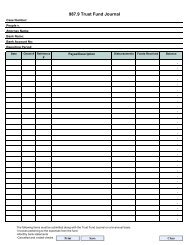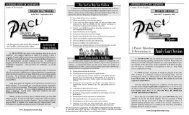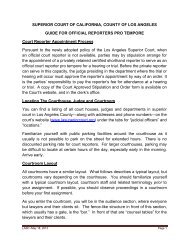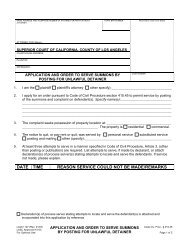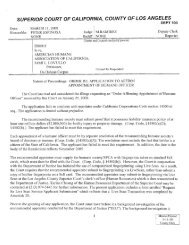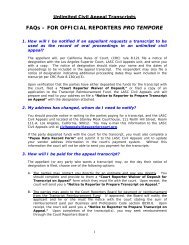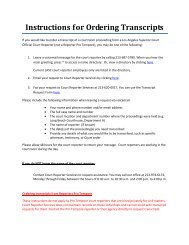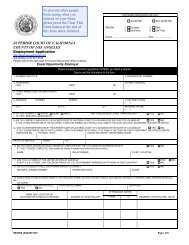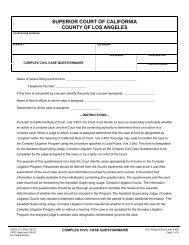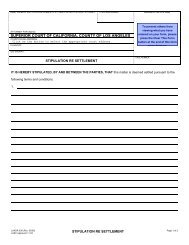2008 Annual Report - Superior Court of California - County of Los ...
2008 Annual Report - Superior Court of California - County of Los ...
2008 Annual Report - Superior Court of California - County of Los ...
You also want an ePaper? Increase the reach of your titles
YUMPU automatically turns print PDFs into web optimized ePapers that Google loves.
Faculty training includes a variety <strong>of</strong> teaching methods, including the use <strong>of</strong> video clips, roleplaying<br />
activities, hypothetical situations and case law. The teaching methods are interactive,<br />
drawing on the experiences <strong>of</strong> each student.<br />
The program features small classes and peer-to-peer teaching by teams <strong>of</strong> judicial <strong>of</strong>ficers<br />
who have completed a week <strong>of</strong> training on the latest adult education methods.<br />
The wide range <strong>of</strong> classes held this year includes:<br />
Advanced Evidence: Expert Issues in Complex Criminal Cases,<br />
Writs <strong>of</strong> Habeas Corpus,<br />
Family Law Seminar,<br />
Introduction to Search Warrants,<br />
Disruptive Defendants and Problem Pro Pers,<br />
Civil Case Management,<br />
A Criminal Judge’s Guide to Dealing with Difficult Attorneys,<br />
Mastering Proven Techniques for Successful Settlements,<br />
Large Issues in Small Claims,<br />
Civil Expert Witnesses, and<br />
Discovery Issues<br />
Besides JES, we also provide numerous other educational events and opportunities for judicial<br />
<strong>of</strong>ficers, including the Diversity Summit, the Family Law <strong>Annual</strong> Seminar, probate classes,<br />
computer s<strong>of</strong>tware training, the judicial leadership class and the Legislative Staff Seminar.<br />
‘Crash’ Course<br />
<strong>Court</strong>esy <strong>of</strong> Lionsgate<br />
A“ ‘Crash’ Course on Fairness in the <strong>Court</strong>s” is an innovative judicial<br />
fairness education course that uses thought-provoking clips from the<br />
Academy Award-winning movie “Crash” to raise issues and stimulate<br />
discussion.<br />
The Paul Haggis-directed film, which explores race relations in modern-day<br />
<strong>Los</strong> Angeles, follows roughly a dozen L.A. residents from a variety <strong>of</strong> races and<br />
social classes as they intersect — in effect, crash into one another — over a 36-<br />
hour period.<br />
The class, which has been two years in the making, was first developed as a<br />
project <strong>of</strong> the Judicial Fairness Education Subcommittee <strong>of</strong> the <strong>Los</strong> Angeles<br />
<strong>Superior</strong> <strong>Court</strong>’s Access and Fairness Committee.<br />
The course, which is conducted as a small group seminar, is team-taught by judicial <strong>of</strong>ficers and<br />
focuses on judicial ethics as they apply to the many fairness issues that may arise in the<br />
courtroom. The judicial <strong>of</strong>ficers taking the course learn to recognize access and fairness issues in<br />
their courtrooms and how to implement practical solutions and strategies for dealing with them.<br />
An intensive, full-day faculty development program was held in August. A pilot session <strong>of</strong><br />
the “Crash” course was held on Oct. 30, where it received positive responses from participants.<br />
It will be <strong>of</strong>fered twice in the spring <strong>of</strong> <strong>2008</strong> as part <strong>of</strong> the regular JES course <strong>of</strong>ferings. It is<br />
expected to be eligible for two hours <strong>of</strong> Judicial Elective Ethics credit.<br />
42 Delivering Justice to a Changing Community



